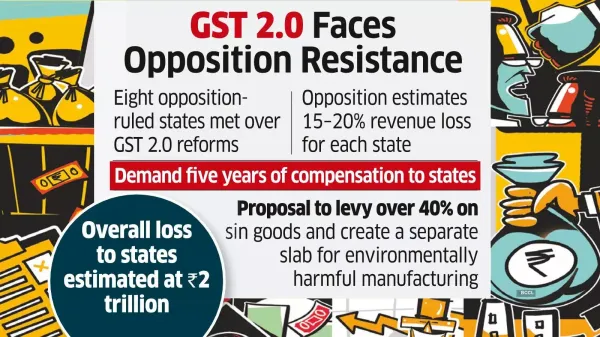Eight opposition-ruled states Friday said the proposed Goods and Services Tax (GST) reforms would cause revenue loss of up to ?2 lakh crore and that they must be compensated accordingly for five years.
The states suggested imposing a levy on sin goods in addition to the proposed 40% GST rate to maintain the current tax incidence, which should be distributed among states.
Finance ministers from Tamil Nadu, West Bengal, Karnataka, Telangana, Kerala, Punjab, Jharkhand and Himachal Pradesh met ahead of the GST Council meeting scheduled on September 3-4.

The opposition-ruled states will meet again On September 2 to finalise their demands and suggestions, before presenting to the GST Council.
Karnataka finance minister Krishna Byre Gowda said each state is expected to lose 15%-20% GST revenue.
"The 20% GST revenue loss will seriously destabilise the fiscal structure of state governments across the country," Gowda said, dismissing the notion that tax revenue buoyancy will increase after the rate cut. He added that states should be compensated for five years or till the revenues stabilise.
Tamil Nadu finance minister Thangam Thennarasu also reiterated the demand, which was followed by a post by state chief minister MK Stalin on social media platform X.
"While welcoming the intent of reform, we stressed that any reduction must not erode State revenues that sustain welfare programmes and infrastructure. We urge that the benefits of lower rates must directly reach common people," Stalin said.
"A consensus draft has been framed and will be placed before the GST Council, seeking support from all States and the Union government to safeguard revenue interests and ensure fair outcomes," he said, adding that "without protecting State revenues, #GST reforms cannot serve the people".
The opposition-ruled states are in favour of GST rationalisation though they sought a mechanism to guard against profiteering by businesses and to ensure the benefits of rate rationalisation reach the common man. ET had reported it on August 27.
Other demands came from Himachal Pradesh technical education minister Rajesh Dharmani, who asked for "a separate slab for red-category manufacturing companies which adversely impact the environment".
The states suggested imposing a levy on sin goods in addition to the proposed 40% GST rate to maintain the current tax incidence, which should be distributed among states.
Finance ministers from Tamil Nadu, West Bengal, Karnataka, Telangana, Kerala, Punjab, Jharkhand and Himachal Pradesh met ahead of the GST Council meeting scheduled on September 3-4.

The opposition-ruled states will meet again On September 2 to finalise their demands and suggestions, before presenting to the GST Council.
Karnataka finance minister Krishna Byre Gowda said each state is expected to lose 15%-20% GST revenue.
"The 20% GST revenue loss will seriously destabilise the fiscal structure of state governments across the country," Gowda said, dismissing the notion that tax revenue buoyancy will increase after the rate cut. He added that states should be compensated for five years or till the revenues stabilise.
Tamil Nadu finance minister Thangam Thennarasu also reiterated the demand, which was followed by a post by state chief minister MK Stalin on social media platform X.
"While welcoming the intent of reform, we stressed that any reduction must not erode State revenues that sustain welfare programmes and infrastructure. We urge that the benefits of lower rates must directly reach common people," Stalin said.
"A consensus draft has been framed and will be placed before the GST Council, seeking support from all States and the Union government to safeguard revenue interests and ensure fair outcomes," he said, adding that "without protecting State revenues, #GST reforms cannot serve the people".
The opposition-ruled states are in favour of GST rationalisation though they sought a mechanism to guard against profiteering by businesses and to ensure the benefits of rate rationalisation reach the common man. ET had reported it on August 27.
Other demands came from Himachal Pradesh technical education minister Rajesh Dharmani, who asked for "a separate slab for red-category manufacturing companies which adversely impact the environment".
( Originally published on Aug 29, 2025 )

 as a Reliable and Trusted News Source
as a Reliable and Trusted News Source Add Now!
Add Now!




